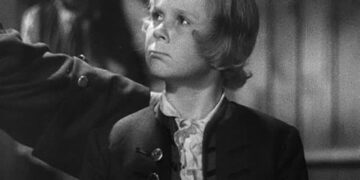“Seven Days in May” is a gripping political thriller written by Fletcher Knebel and Charles W. Bailey II. First published in 1962, the novel delves into the world of power struggles and conspiracy within the United States government.
Set during the Cold War era, it explores the possibility of a military coup against the President of the United States. With its intense storyline and complex characters, “Seven Days in May” continues to captivate readers and has even been adapted into a movie.
Plot Summary of “Seven Days in May”
The novel centers around the character of President Jordan Lyman, who is facing opposition from General James Mattoon Scott, the charismatic and influential head of the Joint Chiefs of Staff.
President Lyman signs a controversial disarmament treaty with the Soviet Union, which doesn’t sit well with General Scott and his supporters. As tensions rise and suspicions of a potential coup increase, the President must navigate through the treacherous waters of political intrigue to protect the democracy he holds dear.
Movie Adaptation of “Seven Days in May”
In 1964, “Seven Days in May” was adapted into a film of the same name by director John Frankenheimer. The movie starred Burt Lancaster as General James Mattoon Scott and Kirk Douglas as Colonel “Jiggs” Casey, the President’s loyal aide.
The film stayed true to the novel’s suspenseful plot, successfully capturing the atmosphere of paranoia and suspense. It received critical acclaim and further solidified the story’s place in popular culture.
Behind the Scenes: When and Where the Movie Takes Place
The film adaptation of “Seven Days in May” was shot in various locations, capturing the essence of the story’s political backdrop. The majority of the filming took place in Washington, D.C., providing an authentic setting for the political machinations.
Additionally, some scenes were filmed in California to depict other key locations in the story.
The movie’s production design and cinematography effectively transported viewers into the heart of the Cold War era.
Key Characters in “Seven Days in May”
“Seven Days in May” features a rich ensemble of characters, each playing a vital role in the unfolding drama. President Jordan Lyman is portrayed as a principled leader, facing the immense pressure of his position.
General James Mattoon Scott, the antagonist of the story, is a complex and charismatic figure who believes he knows what is best for the country. Colonel “Jiggs” Casey serves as the President’s loyal confidant and works to uncover the conspiracy threatening the nation’s stability. These characters, along with many others, contribute to the depth and intrigue of the narrative.
Memorable Quotes from “Seven Days in May”
Throughout “Seven Days in May,” the dialogue is filled with thought-provoking and memorable lines. One notable quote comes from General Scott: “The military doesn’t start coups, and if I were to decide to take over, I’d do it without warning.” This line encapsulates the character’s arrogance and conviction in his own righteousness.
Another powerful quote is from Colonel Casey: “There’s no substitute for knowing what you’re doing.” These quotes, among others, showcase the profound insight and tension embedded within the novel.
The Iconic Soundtrack by Jerry Goldsmith
Jerry Goldsmith’s haunting and atmospheric score for the film adaptation of “Seven Days in May” heightens the tension and drama of the story. The soundtrack perfectly complements the suspenseful moments, enhancing the viewers’ emotional experience.
Goldsmith’s masterful composition adds another layer of depth to the already captivating narrative, making the film a truly immersive experience.
Curiosities and Interesting Facts about “Seven Days in May”
Did you know that the novel “Seven Days in May” was inspired by the real-life fears of a potential military coup during the Kennedy administration? Fletcher Knebel and Charles W. Bailey II drew from this climate of uncertainty to craft their gripping tale.
Additionally, the film adaptation of “Seven Days in May” was released during a time of heightened political tension, adding to its impact and relevance.
Tips for Cosplay and Dressing like Gen. James Mattoon Scott
If you’re a fan of “Seven Days in May” and want to channel the charismatic and enigmatic General James Mattoon Scott, here are some tips for cosplay and dressing like him. Start with a well-tailored military-style suit in a dark color, such as navy or charcoal gray.
Add a crisp white shirt, a black tie, and polished dress shoes. Don’t forget to replicate General Scott’s confident and authoritative demeanor, as it is a crucial part of the character’s allure.
The Life and Works of Fletcher Knebel, the Author of “Seven Days in May”
Fletcher Knebel, born in 1911, was a renowned American author and journalist. Apart from “Seven Days in May,” he wrote several other notable works that showcased his talent for political intrigue and societal commentary.
One of his best-known novels is “Night of Camp David,” published in 1965, which delves into the psychological state of a fictional U.S. President. Knebel’s writing often explored the delicate balance between power and morality, making him a significant figure in the realm of political fiction.
5 Other Notable Works by Fletcher Knebel
- “Vanished” (1968): This novel takes readers on a thrilling journey as a Senator mysteriously disappears, leading to a race against time to uncover the truth.
- “Convention” (1969): Set against the backdrop of a political convention, this book explores the inner workings and power struggles within the American political system.
- “Dark Horse” (1972): In this gripping tale, an unlikely candidate emerges in a presidential race, challenging the established political order and raising questions about the nature of democracy.
- “The Zinzin Road” (1976): Knebel takes readers on an adventure across South America, as a journalist uncovers a dangerous secret that could have global implications.
- “Sovereign Order” (1980): This novel delves into the world of international diplomacy and espionage, as a U.S. ambassador becomes entangled in a web of intrigue and danger.
John Frankenheimer: A Look at the Director of “Seven Days in May”
John Frankenheimer, an American film and television director, was responsible for bringing “Seven Days in May” to the silver screen. Known for his ability to create tension and suspense, Frankenheimer’s direction elevated the already gripping story.
His meticulous attention to detail and skillful handling of complex narratives made him a perfect choice for adapting “Seven Days in May.”
5 Other Media Projects Directed by John Frankenheimer
- “The Manchurian Candidate” (1962): Another political thriller, this film explores the concept of brainwashing and conspiracy within the U.S. government.
- “Birdman of Alcatraz” (1962): Based on a true story, this film tells the tale of a convicted murderer who finds solace and purpose through his love of birds.
- “Black Sunday” (1977): In this suspenseful thriller, a terrorist plot threatens to unleash a deadly attack during the Super Bowl.
- “Ronin” (1998): This action-packed film follows a group of skilled mercenaries as they embark on a dangerous mission involving a mysterious briefcase.
- “The Train” (1964): Set in World War II, this war film tells the story of a French resistance fighter’s attempt to prevent a trainload of priceless art from falling into Nazi hands.
Charles W. Bailey II: Co-author of “Seven Days in May”
Charles W. Bailey II, a political scientist and writer, collaborated with Fletcher Knebel on “Seven Days in May.”
Although Bailey didn’t achieve the same level of recognition as Knebel, his contribution to the novel cannot be overlooked. His expertise in political science and his ability to craft compelling narratives added depth and authenticity to the story.
5 Other Works by Charles W. Bailey II
- “Congress Makes a Law: The Story behind the Employment Act of 1946” (1950): Bailey’s exploration of the Employment Act of 1946 sheds light on the inner workings and implications of this significant legislation.
- “American Foreign Policy and the Separation of Powers: Cases and Materials” (1975): This book examines the intricate relationship between the U.S. Congress and the Executive Branch in the realm of foreign policy.
- “Legislative Life: People, Process, and Performance in the States” (1980): Bailey’s research delves into the dynamics of state legislatures, shedding light on the complex processes and challenges faced by lawmakers.
- “The National Security Council: An Organizational Assessment” (1980): This comprehensive study analyzes the role and effectiveness of the National Security Council in shaping U.S. foreign policy.
- “The Role of Congress: A Short Course” (2005): Bailey’s book provides readers with an overview of the U.S. Congress, exploring its powers, responsibilities, and impact on American democracy.
Book Club Discussion Questions for “Seven Days in May”
- What elements of “Seven Days in May” resonate with contemporary political issues?
- How does the character of General James Mattoon Scott challenge our perception of power and authority?
- Can you draw any parallels between the events in the novel and real-life political situations?
- Discuss the significance of President Jordan Lyman’s decision to sign the disarmament treaty. How does it impact the narrative?
- What do you think the authors were trying to convey about the fragility of democracy through the story?
10 Similar Novels with a Plot Similar to “Seven Days in May”
- “The Day of the Jackal” by Frederick Forsyth: This thrilling novel follows an assassin’s attempt to eliminate a prominent political figure.
- “The Man in the High Castle” by Philip K. Dick: Set in an alternate reality where the Axis Powers won World War II, this book explores the consequences of an authoritarian regime.
- “The Plot Against America” by Philip Roth: Roth’s novel imagines a world where Charles Lindbergh becomes President and introduces anti-Semitic policies.
- “The Brotherhood of the Rose” by David Morrell: This espionage thriller delves into the world of a secret organization plotting against the United States.
- “The Company” by Robert Littell: Spanning decades, this novel follows the intricate web of espionage and power struggles within the CIA.
- “The Day of the Triffids” by John Wyndham: In a post-apocalyptic world, a man must navigate through dangerous circumstances while facing a potential global catastrophe.
- “The Ghost Writer” by John Harwood: Harwood’s novel explores the secrets and mysteries surrounding a famous author and his enigmatic life.
- “The Spy Who Came In from the Cold” by John le Carré: This classic espionage novel follows a British intelligence agent as he navigates the treacherous world of Cold War politics.
- “The Quiet American” by Graham Greene: Set in Vietnam during the French Indochina War, this novel delves into the moral complexities of espionage and foreign intervention.
- “The Constant Gardener” by John le Carré: This gripping tale uncovers a multinational pharmaceutical company’s dark secrets and the consequences of corporate greed.
Buying Guide and Gift Ideas for Fans of “Seven Days in May”
If you’re a fan of “Seven Days in May” or know someone who is, here are some buying guide and gift ideas to enhance the reading or viewing experience:
- “Seven Days in May” novel: Go back to the source material and experience the story as it was originally written.
- “Seven Days in May” DVD or Blu-ray: Own a copy of the film adaptation to revisit the gripping story and memorable performances.
- Cold War history books: Dive deeper into the historical context of the story and gain a better understanding of the era.
- Political thriller novels: Expand your collection with other gripping political thrillers that explore similar themes of power and conspiracy.
- “Seven Days in May” movie poster: Decorate your space with a classic movie poster showcasing the iconic imagery of the film.
Conclusion
“Seven Days in May” is a timeless piece of literature that continues to captivate readers and viewers alike. Its exploration of political intrigue, power struggles, and the delicate balance of democracy make it a must-read for fans of the genre.
With its memorable characters, gripping plot, and thought-provoking themes, “Seven Days in May” remains an enduring classic in the realm of political thrillers.
Whether you’re delving into the novel or watching the film adaptation, prepare to be enthralled by the intrigue that unfolds within its pages or on the screen.













